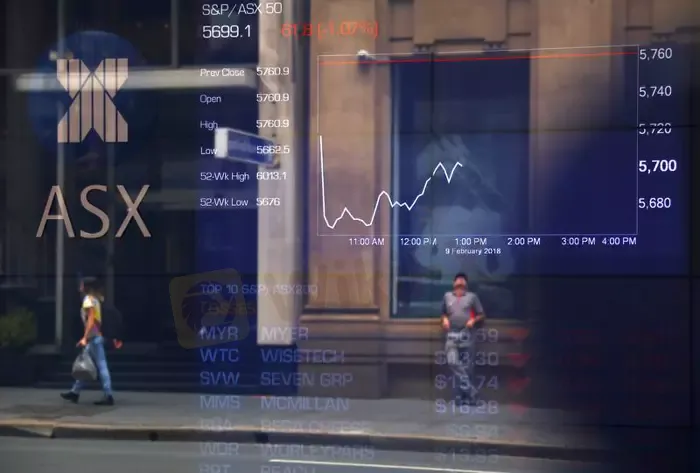简体中文
繁體中文
English
Pусский
日本語
ภาษาไทย
Tiếng Việt
Bahasa Indonesia
Español
हिन्दी
Filippiiniläinen
Français
Deutsch
Português
Türkçe
한국어
العربية
Asia shares subdued, dollar refreshed by U.S. rate risks
Abstract:Asian share markets made a stuttering start on Monday and the dollar held firm after a stunning U.S. payrolls report pushed back against talk of recession but also bolstered the case for more super-sized rate hikes.

Markets quickly moved to price around a 70% chance the Federal Reserve will lift rates by 75 basis points in September, sending two-year yields up 20 basis points on Friday and further inverting the curve.
The blockbuster data only raised the stakes for the July U.S. consumer prices report due on Wednesday, which could see a slight pullback in headline growth, but likely a further acceleration in core inflation.
“Despite sluggish growth and an expected slide to a 0.2% m/m July CPI gain, the Fed will likely raise policy rates 75 bps at its September meeting,” said Bruce Kasman, head of economic research at JPMorgan.
“The key question is whether it will decide that a material rise in the unemployment rate is necessary to achieve its objectives,” he warned. “If this is the case, its guidance on rates will move significantly higher, alongside a message that it will likely prove to be less sensitive to near-term growth disappointments.”
The risk haunted equity markets with S&P 500 futures and Nasdaq futures both down 0.1%.
MSCI‘s broadest index of Asia-Pacific shares outside Japan dipped 0.5%, after three sessions of gains. Japan’s Nikkei edged up 0.3% and South Koreas KOSPI went flat. Chinese blue chips eased 0.2%.
EUROSTOXX 50 futures fared better and added 0.5%, while FTSE futures rose 0.3%.
There was little obvious market reaction to news that the U.S. Senate on Sunday passed a sweeping $430 billion bill intended to fight climate change after some compromises on taxation within the deal.
“The changes look unlikely to substantially change the net fiscal impact of the legislation, which continues to look likely to be less than 0.1% of GDP for the next several years, as new spending and new taxes roughly offset,” said analysts at Goldman Sachs.
The exceptional dollar
Two-year Treasury yields were up at 3.25%, fully 40 basis points above 10-year yields.
Bonds also got a safe-haven bid due to unease over Beijings sabre rattling against Taiwan as China conducts four days of military exercises around the island.
Chinese data out over the weekend showed exports picked up unexpectedly in July with a gain of 18%, while imports lagged with a rise of just 2.3%.
The jobs boom combined with the jump in yields to bolster the U.S. dollar, which was up at 106.640 against a basket of currencies having gained 0.8% on Friday. [FRX/]
“This key data point is a million miles from a current recession, both on a change of employment, and a levels of unemployment basis,” said Alan Ruskin, global head of G10 FX strategy at Deutsche Bank.
“Data like this will further any thoughts about ‘U.S. exceptionalism’ and is very positive for the USD against all currencies.”
The dollar held at 135.27 yen after jumping 1.6% on Friday, while the euro was struggling at $1.0182 and not far from chart support around $1.0095.
The single currency was not helped by news Moody‘s had cut Italy’s outlook to negative as Prime Minister Mario Draghi‘s resignation shook the country’s political landscape.
The rise in the dollar was a setback for gold, though it had managed to bounce from the lows hit on Friday to stand at $1,773. [GOL/]
Oil prices recouped early losses to eke out some gains, having suffered the worst week since April on worries about stalling global demand as central banks keep tightening. [O/R]
Brent added 25 cents to $95.17, while U.S. crude rose 19 cents to $89.20 per barrel.

Disclaimer:
The views in this article only represent the author's personal views, and do not constitute investment advice on this platform. This platform does not guarantee the accuracy, completeness and timeliness of the information in the article, and will not be liable for any loss caused by the use of or reliance on the information in the article.
Read more

Top 10 Trading Indicators Every Forex Trader Should Know
Master the top 10 Forex trading indicators to analyze real-time Forex quotes, trends, and market signals. Learn strategies to boost accuracy and avoid mistakes.

Geopolitical Events: What They Are & Their Impact?
You've heard many times that geopolitical events have a significant impact on the Forex market. But do you know what geopolitical events are and how they affect the FX market? Let us learn about it today.

Why Do You Feel Scared During Trade Execution?
Trade execution is a pivotal moment for traders. It is when analysis turns into action, and potential profits or losses become reality. However, for many traders, this moment is accompanied by fear. Why does this happen, and how can you address it?

WikiEXPO Global Expert Interview: Simone Martin—— Exploring Financial Regulation Change
In the midst of financial innovation and regulation, WikiGlobal, the organizer of WikiEXPO, stays abreast of industry trends and conducts a series of insightful and distinctive interviews on pivotal topics. We are delighted to have the privilege of inviting Simone Martin for an in-depth conversation this time.
WikiFX Broker
Latest News
Volkswagen agrees deal to avoid Germany plant closures
Geopolitical Events: What They Are & Their Impact?
Top 10 Trading Indicators Every Forex Trader Should Know
WikiEXPO Global Expert Interview: Simone Martin—— Exploring Financial Regulation Change
TradingView Launches Liquidity Analysis Tool DEX Screener
MultiBank Group Wins Big at Traders Fair Hong Kong 2024
'Young investors make investment decisions impulsively to keep up with current trends' FCA Reveals
Why Do You Feel Scared During Trade Execution?
CySEC Settles Compliance Case with Fxview Operator Charlgate Ltd
Scope Markets Review: Trustworthy or Risky?
Currency Calculator


